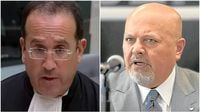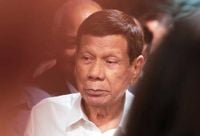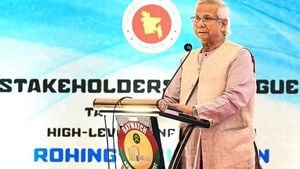In a case that has gripped the Philippines and drawn international attention, former President Rodrigo Duterte remains at the center of a high-stakes legal battle before the International Criminal Court (ICC) in The Hague. As of August 25, 2025, Duterte is detained at the Scheveningen Penitentiary Complex, awaiting a crucial confirmation of charges hearing scheduled for September 23. The proceedings mark a pivotal moment in the ICC’s inquiry into alleged crimes against humanity committed during Duterte’s controversial “war on drugs.”
Contrary to recent media reports, Duterte has not withdrawn his plea to disqualify ICC Prosecutor Karim Khan over alleged conflict of interest and bias. According to the Philippine Daily Inquirer, Nicolas Kaufman, Duterte’s lead lawyer, clarified that the defense’s move to seek Khan’s disqualification came after they became aware of the “true extent of Khan’s conflict and bias.” Kaufman argued that Khan had "hidden materials concerning his former representation from the court, including the fact that he had targeted the former president as the first among several worthy of prosecution back in 2018."
Khan, who disclosed on March 6 that he had previously served pro bono as a lawyer for drug war victims, maintained that his role was limited to reviewing a submission urging the ICC’s former chief prosecutor to open an investigation into Duterte’s actions. Addressing concerns over partiality, Khan emphasized that the ongoing investigation is led by a team of lawyers from the Office of the Prosecutor (OTP), directly supervised by a deputy prosecutor—not by him personally. He insisted, "There should be no presumption that my past role would result in partiality toward the evidence at hand," adding that the scope of the investigation had "significantly deepened" over the past seven years.
Kaufman, meanwhile, explained that earlier Philippine media reports about dropping the plea were taken out of context and based on an initial filing in April, shortly before Khan went on leave pending a United Nations investigation into unrelated allegations. "At the time, the defense relied on what is termed 'the presumption of prosecutorial regularity,' which has now been rebutted," Kaufman told the Inquirer.
While legal maneuvering continues, the ICC’s case against Duterte advances. The central question: Did the former president orchestrate a campaign of extrajudicial killings as part of a systematic attack on civilians, amounting to crimes against humanity? According to GMA Integrated News, government records show over 6,000 drug suspects were killed in police operations during Duterte’s administration, though human rights groups estimate the true toll could be as high as 30,000.
Victims of the drug war are playing an increasingly active role in the proceedings. As ICC-accredited lawyer Joel Butuyan explained to Super Radyo dzBB, "Even after the pre-trial, even if the trial is already ongoing, the victims can still apply for participation. That is ongoing." Butuyan noted that the main proceedings for victim participation occur during the reparation stage, after a conviction, when damages for victims are discussed. In the pre-trial phase, 303 victims have already sought to participate, grouped into three clusters—A, B, and C—with Groups A and B considered more likely to qualify, pending a final decision by the pre-trial chamber.
In the Philippines, the House of Representatives is also taking steps to support victims. Human rights panel chairperson Bienvenido Abante welcomed the decision of more than 300 victims to participate in the ICC proceedings, assuring them of protection if they choose to testify before the House’s Quad Committee, which includes the Committees on Dangerous Drugs, Human Rights, Public Order and Safety, and Public Accounts. "We would like the victims to now open themselves up, that we have the Quad Comm here and we are here to protect the victims. It's high time for them to come and we can assure them that whatever they say in that hearing, we could be able to give them protection," Abante stated in an online interview, according to GMA Integrated News.
For Duterte, the legal fight is far from over. On August 22, his lead lawyer filed a detailed plan for the upcoming confirmation of charges hearing, outlining a strategy that devotes three to four hours to challenging the prosecution’s claims about Duterte’s liability and the legal standards for crimes against humanity. The defense plans to spend 30 minutes each on opening and closing statements, focusing their main arguments on disputing the prosecution’s evidence and interpretations of international law. Kaufman wrote to the court, "For the sake of clarity and the historical record, Mr. Duterte did not commit any criminal offense. Mr. Duterte served his city and country, faithfully and with pride, for many years."
The confirmation hearing will be presided over by Judges Iulia Antoanella Motoc, Reine Adélaïde Sophie Alapini-Gansou, and María del Socorro Flores Liera. This stage is critical: the judges will decide whether there is enough evidence to establish substantial grounds that Duterte committed the alleged crimes. If the charges are confirmed, the case will proceed to trial; if not, the charges could be dismissed or returned to the prosecution for further investigation.
Duterte’s defense is expected to focus on undermining the prosecution’s attempt to link him personally to the killings, as well as challenging whether the alleged acts meet the "contextual requirements" necessary for crimes against humanity under international law. The defense’s approach aims to cast doubt on the factual and legal underpinnings of the case, a strategy that will be tested before an international audience.
The case has polarized opinion in the Philippines and beyond. Human rights advocates have long called for accountability, insisting that the scale and systematic nature of the killings demand international intervention. Supporters of Duterte, however, argue that the proceedings are politically motivated and overlook the complexities of the country’s struggle against illegal drugs. The international community, for its part, is closely watching the proceedings as a test of the ICC’s ability to hold powerful leaders accountable for alleged human rights abuses.
Amid these developments, Duterte has renewed his appeal for interim release to an undisclosed country willing to accept him. Yet, with the confirmation of charges hearing fast approaching, his immediate fate will be determined by the ICC’s judges. The outcome could have profound implications—not only for Duterte, but for the broader questions of justice, accountability, and the rule of law in the Philippines and on the global stage.
As the world awaits the ICC’s decision, the voices of the victims, the arguments of the defense, and the scrutiny of the international community converge in a courtroom thousands of miles from Manila. The next chapter in this extraordinary legal saga is about to unfold.





